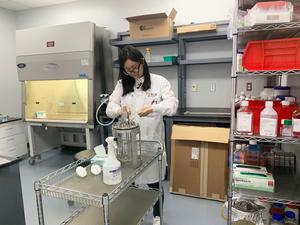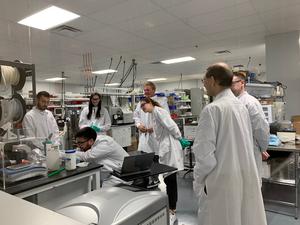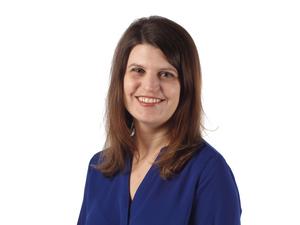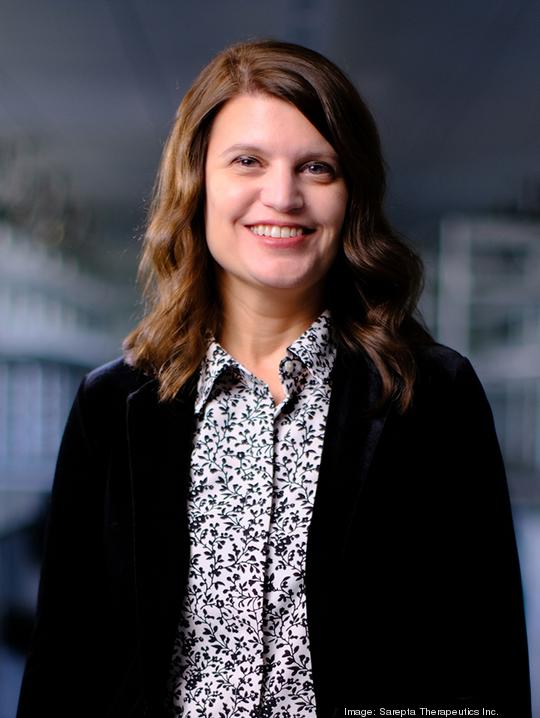
A biopharmaceutical company has asked the U.S. Food and Drug Administration to approve a gene therapy invented at Nationwide Children's Hospital to treat a fatal form of muscular dystrophy. If successful, it would be the second therapy from the Columbus institution to hit the market.
Sarepta Therapeutics Inc. announced Thursday that it submitted the Biologics License Application for the Duchenne muscular dystrophy treatment, named SRP-9001 for now. The company is going through the agency's "accelerated" approval process, although the review will still take several months.
“Every hour of every day, this ruthless disease, Duchenne, robs thousands of children in the United States of muscle as it steals their future from them," Sarepta CEO Doug Ingram said in a news release. "(The approval application) is a significant milestone in our quest to intervene with urgency on behalf of the children we serve.”
Louise Rodino-Klapac – Sarepta's Columbus-based executive vice president, chief scientific officer and head of R&D – co-invented the therapy when she was at Children's Wexner Research Institute, along with the hospital's Dr. Jerry Mendell. If approved, it would mean millions of dollars in milestone payments and royalties to the hospital.
It's one of eight gene therapies that Cambridge, Massachusetts, biotech licenses from Children's, from which it hired Rodino-Klapac in 2018. The next year, it acquired hospital spinoff Myonexus Therapeutics Inc., which was developing other muscular dystrophy therapies invented by Rodino-Klapac – also that company's chief science officer.
Sarepta last fall opened its main R&D laboratory in 85,000 square feet at 4201 Easton Commons.This June it started construction on an 18,000-square-foot expansion, according to its most recent quarterly report, and could eventually take 167,000 square feet in the office campus. The lab has grown to about 120 of Sarepta's more than 1,000 employees. Plans are to grow to 240 jobs in Columbus over the next four years, a spokeswoman said via email.
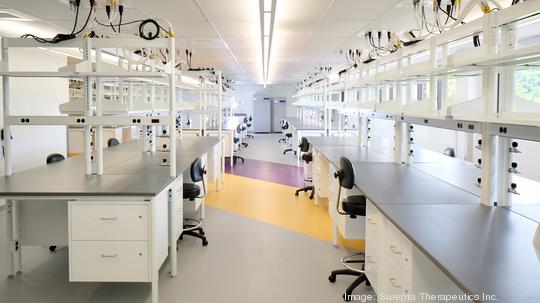
Duchenne is among the most common fatal genetic disorders, occurring almost exclusively in boys, who gradually lose muscle function and typically dying by age 30. It is diagnosed in one out of every 3,500 to 5,000 newborn males worldwide. The therapy inserts a portion of the missing gene – enough for the body to make "micro-dystrophin," a small but functioning version of the deficient protein. The full gene is too big to fit in the modified virus that delivers the DNA to the patient's cells.
The FDA granted fast-track status to SRP-9001 in 2020, and Mendell led early clinical trials at Children's. Sarepta's application proposes that results of an ongoing trial at several hospitals globally, including Children's, be used to support the approval. Results have been positive from earlier trials up to four years post-treatment, according to the release.
The investigational therapy is the single largest research and development expense for Sarepta: $222 million, half the R&D total, for the first six months of this year, according to the quarterly report. Pharmaceutical giant Roche reimbursed $44 million of that under a commercialization partnership. If approved, Sarepta would market the therapy in the U.S. while Roche would have international rights.
Overall Sarepta had a net loss of $339 million on $444 million revenue in the first six months. Its full-year revenue was $701 million in 2021.
Gene therapies are the most expensive pharmaceuticals, with price tags in the millions – but they require a single treatment and prevent debilitating decline and eventual death, compared with hundreds of thousands spent each year for treatments that only ease symptoms.
The first Children's-invented therapy to get FDA approval, in 2019, was Zolgensma, which halts progression of a fatal degenerative muscular condition in infants. It's licensed to Novartis Corp. (NYSE: NVS), and priced at $2.1 million. Zolgensma last year generated $1.35 billion in global sales, according to Novartis's annual report. The amount paid to Children's is not disclosed, but the hospital said it was the main contributor to record technology licensing income of $68.9 million last year.
Each gene therapy infusion takes trillions of the modified viruses that deliver the gene portion to cells. Catalent inc., based in Somerset, New Jersey, is the manufacturer for this therapy.
Columbus has two startups aiming to ease an industry-wide shortage of manufacturing capacity for gene therapies: Grove City-based Forge Biologics Inc., which is in the process of bringing online the largest bioreactors available for this kind of production, and Children's spinoff Andelyn Biosciences Inc., which last week announced its Columbus facility has completed construction and is ready for clients.

